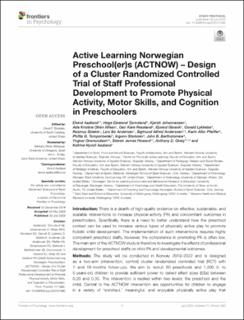Active Learning Norwegian Preschool(er)s (ACTNOW) – Design of a Cluster Randomized Controlled Trial of Staff Professional Development to Promote Physical Activity, Motor Skills, and Cognition in Preschoolers [Study protocol]
Aadland, Eivind; Tjomsland, Hege Eikeland; Johannessen, Kjersti; Nilsen, Ada Kristine Ofrim; Resaland, Geir Kåre; Glosvik, Øyvind; Lykkebø, Osvald; Stokke, Rasmus; Andersen, Lars Bo; Anderssen, Sigmund Alfred; Pfeiffer, Karin Allor; Tomporowski, Phillip D; Størksen, Ingunn; Bartholomew, John; Ommundsen, Yngvar; Howard, Steven James; Okely, Anthony D.; Aadland, Katrine Nyvoll
Peer reviewed, Journal article
Published version
Permanent lenke
https://hdl.handle.net/11250/2687666Utgivelsesdato
2020Metadata
Vis full innførselSamlinger
Originalversjon
Aadland, E., Tjomsland, H. E., Johannessen, K., Nilsen, A. K. O., Resaland, G. K., Glosvik, Ø., … Aadland, K. N. (2020). Active Learning Norwegian Preschool(er)s (ACTNOW) – Design of a Cluster Randomized Controlled Trial of Staff Professional Development to Promote Physical Activity, Motor Skills, and Cognition in Preschoolers. Frontiers in Psychology, 11, 1382. 10.3389/fpsyg.2020.01382Sammendrag
Introduction: There is a dearth of high-quality evidence on effective, sustainable, and scalable interventions to increase physical activity (PA) and concomitant outcomes in preschoolers. Specifically, there is a need to better understand how the preschool context can be used to increase various types of physically active play to promote holistic child development. The implementation of such interventions requires highly competent preschool staffs, however, the competence in promoting PA is often low. The main aim of the ACTNOW study is therefore to investigate the effects of professional development for preschool staffs on child PA and developmental outcomes. Methods: The study will be conducted in Norway 2019–2022 and is designed as a two-arm (intervention, control) cluster randomized controlled trial (RCT) with 7- and 18-months follow-ups. We aim to recruit 60 preschools and 1,200 3- to 5-years-old children to provide sufficient power to detect effect sizes (ESs) between 0.20 and 0.30. The intervention is nested within two levels: the preschool and the child. Central to the ACTNOW intervention are opportunities for children to engage in a variety of “enriched,” meaningful, and enjoyable physically active play that supports the development of the whole child. To this end, the main intervention is a 7-month professional development/education module for preschool staff, aimed to provide them with the necessary capacity to deliver four core PA components to the children (moderate-to-vigorous PA, motor-challenging PA, cognitively engaging play, and physically active learning). We will include a range of child-level outcomes, including PA, physical fitness, adiposity, motor skills, socioemotional health, self-regulation, executive function, and learning. At the preschool level, we will describe implementation and adaptation processes using quantitative and qualitative data. Discussion: Professional development of staff and a whole-child approach that integrates PA with cognitively engaging play and learning activities in the preschool setting may provide a feasible vehicle to enhance both physical and cognitive development in young children. ACTNOW is designed to test this hypothesis to provide a sustainable way to build human capital and provide an early solution to lifelong public health and developmental challenges.

